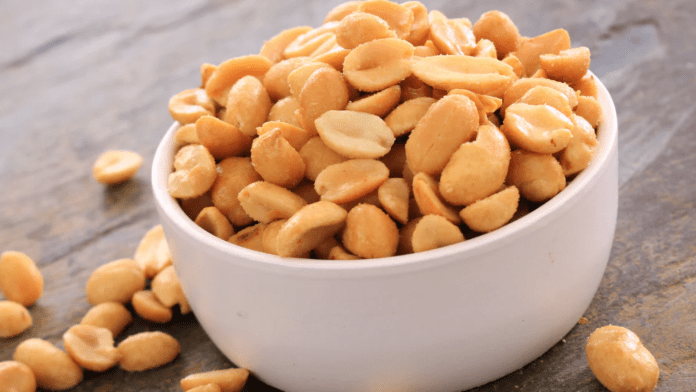Hair loss is a common concern among men, particularly as they age. Bald spots and receding hairlines can significantly affect self-esteem and confidence. While there are various treatments available, many of them are expensive, invasive, or unreliable. However, recent studies have indicated a potential natural solution to promote hair growth in men over the age of 40 – peanuts. Peanuts, which are widely consumed and easily accessible, contain essential nutrients that have shown promising effects on hair health. In this article, we will explore the reasons behind hair loss in men, delve into the nutritional properties of peanuts, and discuss the potential mechanisms through which peanuts can revitalize hair growth. By understanding the benefits of peanuts for hair health, men can make informed choices to combat hair loss and regain their confidence.
Understanding Hair Loss in Men:
Hair loss, scientifically known as androgenetic alopecia, is primarily caused by a combination of genetic and hormonal factors. In men, the hormone dihydrotestosterone (DHT) binds to hair follicles, leading to miniaturization and eventual cessation of hair growth. As men age, their sensitivity to DHT increases, resulting in the common patterns of hair loss, such as receding hairlines and bald spots. Various factors can contribute to hair loss, including stress, poor nutrition, underlying medical conditions, and certain medications. While hair loss is a complex issue, finding effective solutions is essential for those seeking to restore their hair growth.
The Nutritional Power of Peanuts:
Peanuts, scientifically known as Arachis hypogaea, are a widely consumed legume known for their nutritional value. They are rich in essential vitamins, minerals, healthy fats, and plant-based proteins. When it comes to hair health, peanuts offer several key nutrients that can support hair growth and combat hair loss.
1. Biotin: Peanuts are an excellent source of biotin, a B-vitamin that plays a vital role in maintaining healthy hair and scalp. Biotin promotes the production of keratin, a protein that constitutes the structural foundation of hair. By consuming peanuts regularly, men can ensure an adequate supply of biotin to strengthen their hair follicles and stimulate hair growth.
2. Vitamin E: Another crucial nutrient found abundantly in peanuts is vitamin E. This powerful antioxidant protects the scalp and hair follicles from oxidative stress caused by free radicals. Additionally, vitamin E improves blood circulation in the scalp, ensuring that hair follicles receive the necessary nutrients and oxygen for optimal growth.
3. Zinc: Peanuts are a good source of zinc, a mineral that plays a crucial role in hair tissue growth and repair. Zinc deficiency has been linked to hair loss and thinning. By incorporating peanuts into their diet, men can replenish their zinc levels, potentially promoting hair growth and preventing further hair loss.
Mechanisms of Hair Growth Revitalization:
Understanding the mechanisms through which peanuts can revitalize hair growth is essential for comprehending their potential benefits. Although research is ongoing, several theories shed light on how the nutritional components of peanuts may positively impact hair health.
1. Keratin Synthesis: Biotin, present in peanuts, aids in the synthesis of keratin, the primary structural protein of hair. Sufficient biotin levels promote strong and healthy hair follicles, potentially reducing hair loss and stimulating hair growth.
2. Antioxidant Protection: The vitamin E content in peanuts acts as a potent antioxidant that neutralizes free radicals, which can damage hair follicles and impede hair growth. By protecting the scalp from oxidative stress, peanuts may contribute to healthier hair growth.
3. Hormonal Balance: Peanuts contain various nutrients that can help regulate hormone levels, including zinc. As imbalances in hormones like DHT are closely linked to hair loss, maintaining hormonal equilibrium can potentially slow down or prevent further hair loss.
4. Nutrient Supply: Peanuts offer a range of essential nutrients, including biotin, vitamin E, zinc, and proteins, necessary for optimal hair growth. These nutrients support the health of hair follicles, ensuring an adequate supply of building blocks for new hair growth.
Incorporating Peanuts into the Diet:
In order to harness the potential benefits of peanuts for hair growth, it is important to incorporate them into a balanced diet. While peanuts alone cannot guarantee miraculous results, their regular consumption, alongside a nutrient-rich diet, can contribute to overall hair health.
1. Snacking: Peanuts make a convenient and healthy snack option. Men can include a handful of peanuts in their daily routine, ensuring a consistent intake of hair-nourishing nutrients.
2. Peanut Butter: Peanut butter is a versatile and delicious way to incorporate peanuts into the diet. Spread peanut butter on whole grain bread or add it to smoothies for a nutrient boost.
3. Cooking: Peanuts can be added to various dishes, such as stir-fries, salads, and curries. The versatility of peanuts allows for creative and tasty ways to include them in meals.
Final Thoughts:
Hair loss can significantly impact a man’s self-esteem and confidence, particularly as they age. While there are numerous treatments available, exploring natural options is always beneficial. Peanuts, with their rich nutritional profile, offer a potential solution for revitalizing hair growth in men over 40. The biotin, vitamin E, zinc, and proteins found in peanuts contribute to strengthening hair follicles, protecting against oxidative stress, maintaining hormonal balance, and supplying essential nutrients. By incorporating peanuts into their diet, men can potentially slow down hair loss, stimulate hair growth, and promote overall hair health. However, it is important to note that individual results may vary, and consulting a healthcare professional is advisable for personalized advice. Embracing the power of peanuts can be a simple and accessible way to bid farewell to bald spots and restore confidence in men 40 and above.





